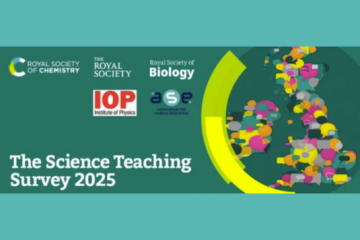Science Teaching Survey 2025 published

Science teaching staff warn they are struggling to deliver practical lessons
Today the results of the 2025 Science Teaching Survey are published. The Royal Society of Chemistry (RSC) commissioned the survey and ASE worked alongside, together with peers from the Institute of Physics (IOP), the Royal Society (RS), and the Royal Society of Biology (RSB).
One of the main findings of the survey is that UK science teachers are struggling to deliver practical lessons. The problem is compounded by an upward trend in numbers of technicians, vital for lab work, considering leaving the profession.
In this major, annual survey of almost 2,000 science teachers and technicians, insufficient time (58%), challenging student behaviour (48%), and the cost of consumables and chemicals (43%) were cited as the biggest challenges to delivering practical science lessons.
The survey found nearly a fifth (19%) of technicians intend to leave the profession by 2027 and a further 39% are unsure whether they will stay in the job. Aside from retirement, low pay (72%), lack of progression opportunities (67%) and high levels of stress and exhaustion (44%) were the key reasons cited for leaving. In 2023, 17% of UK technicians cited high levels of stress and exhaustion as a reason for leaving their role – a 159% increase in just two years.
Marianne Cutler, ASE’s Director Policy and Curriculum Innovation commented:
‘An effective science education is underpinned by an effective science team with strong leadership and a cohesive and supportive culture. However, today’s findings reveal increased budget and staffing challenges, amongst other challenges, across science teachers, technicians and teaching assistants, compared with the 2023 survey results.
For all aspects of science education including the all-important practical work aspects, these findings are deeply concerning. Whilst recognising today’s economic challenges, we call on the Government to invest in school-level science education staffing, professional learning, laboratories, equipment and consumables to enable rewarding careers for all science team members and provide all children, regardless of their circumstances, with the opportunity to reach their full potential.’
ASE’s support for teachers, technicians and practical work
The ASE continues to support both science teachers and technicians in their roles, providing free networking opportunities for members, as well as access to tailored CPD, resources and best practice guidance.
The importance of practical work is a core belief at ASE. We have long been champions of the Gatsby Charitable Foundation’s Good Practical Science report, which provides a framework for good practical science in schools and colleges.
Science leaders, early career teachers and technicians from state secondary schools in challenging circumstances taking part in the CPD offered through ASE’s Keeping Science Practical project reported positively on the practical teaching strategies, curriculum and pedagogical planning, and on the cross-school collaboration and networking opportunities provided. This Wolfson Foundation supported project is now reaching the end of its fourth and final year.
We are delighted that we have now secured funding, through a new partner, to continue to offer extended practical work support to secondary schools and will be making further announcements in the near future of our new programme of activity and how eligible schools can apply.
